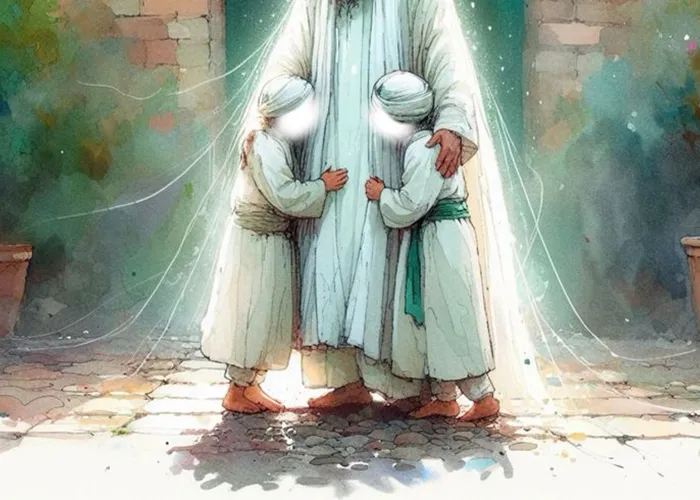Editorial – volume01 Issue20
Celebrating Legacy and Knowledge in the Service of Humanity
As we observe two significant occasions this week—the birth of Lady Zaynab (peace be upon her) and World Science and Peace Week—there’s a meaningful connection between honoring timeless virtues and advocating for education and harmony in today’s world.
Lady Zaynab: Beacon of Strength, Wisdom, and Loyalty
Lady Zaynab (AS), born on 5th Jumada al-Awwal, remains a monumental figure in Islamic history, embodying unwavering resilience, profound wisdom, and unparalleled loyalty. As she embarked on the journey with her brother Imam Husayn (AS) toward Karbala, other prominent figures hesitated, unsure of the path. Lady Zaynab, however, remained resolute. She recognised the profound responsibility of her mission, understanding that loyalty to her brother and the path of justice transcended personal comfort. Her life reflects courage, as illustrated by her response to the tragic events of Karbala. When asked how she perceived the calamities she witnessed, she famously replied:
ما رأیت الّا جمیلا
“I saw nothing but beauty“, highlighting her steadfast trust in the divine purpose of her trials.
Lady Zaynab’s intellectual stature is exemplified by her nephew, Imam Zayn al-Abidin (AS), who referred to her as
أنتِ بِحَمدِ اللّهِ عالِمَةٌ غَيرُ مُعَلَّمَةٍ، فَهِمَةٌ غَيرُ مُفَهَّمَة
“By the grace of Allah, you are a scholar without being taught, an insightful one without being trained”.
Through her eloquent speeches in Kufa and Damascus, she exposed the tyrannical agendas of Yazid and Ibn Ziyad, becoming a voice for truth and justice. Her role as the bearer of her brother’s message and the strength with which she faced adversity have earned her the title Umm al-Masa’ib (Mother of Calamities). Lady Zaynab’s resilience amidst profound losses exemplifies faith’s power to transform suffering into beauty and perseverance into spiritual strength, setting an everlasting example for those who seek to follow the path of truth.
Islam’s Endorsement of Knowledge and Peace
As World Science and Peace Week (9–15 November) reminds us, Islam places great emphasis on the pursuit of knowledge and the establishment of peace. Islam regards knowledge as essential
to a meaningful life, and this is encapsulated in the Qur’anic verse:
هَلْ يَسْتَوِي الَّذِينَ يَعْلَمُونَ وَالَّذِينَ لَا يَعْلَمُونَ
“Are those who know equal to those who do not know?” – Surah Az-Zumar, 39:9.
This reverence for knowledge is reflected in the contributions of Muslim scholars, such as Al-Khwarizmi in mathematics, Ibn Sina in medicine, and Al-Biruni in astronomy. These individuals not only advanced their respective fields but also laid the groundwork for modern science, emphasising learning as a duty to Allah SWT and society.
Islam’s commitment to peace is comprehensive, extending across all levels of human society—from the family unit to the international community. The emphasis on peace begins within the family, where Islam promotes harmony, respect, and mutual understanding between spouses, nurturing a foundation of love and cooperation. Marriage, as described in Islam, is a bond of tranquillity, and both partners are encouraged to show kindness, compromise, and empathy. This teaching fosters a family environment where children are raised with values of respect and understanding, creating a ripple effect of peace in the next generation. The Qur’an highlights the importance of peace in marriage, stating, “And among His signs is that He created for you mates from among yourselves, so that you may find tranquillity in them” (Surah Ar-Rum, 30:21).
The family is seen as the cornerstone of a peaceful society, where forgiveness, compassion, and empathy are deeply valued. Islam encourages families to resolve conflicts with patience and understanding, reinforcing the idea that inner peace within family relationships is the foundation for peace in wider society. This approach extends to the community level, where Islam advocates for reconciliation and understanding among different social groups. Muslims are taught to seek harmony and avoid discord, promoting the well-being of the community as a whole. Kindness to neighbours, justice in transactions, and support for those in need are all acts that build communal peace.
Islam’s vision of peace further extends to national and international relations, encouraging diplomacy, cooperation, and fairness in dealings with others. The Qur’an advises, “And if they incline to peace, then incline to it [also]” (Surah Al-Anfal, 8:61), a verse that highlights the importance of seeking peaceful solutions and building bridges. At the interfaith level, Islam promotes respect for religious diversity and urges Muslims to engage with followers of other faiths in a spirit of mutual understanding and tolerance. The Qur’an advocates for dialogue over conflict, urging believers to find common ground and live alongside others in peace.
This multi-layered approach to peace—beginning with the family, moving through community and national levels, and reaching the global community—demonstrates Islam’s vision for a world where compassion, respect, and understanding form the basis of all human interactions. It is a vision that seeks to nurture peace from the innermost circles of human interaction to the broadest, fostering a harmonious world for all.
Last word
The synergy of Lady Zaynab’s legacy and Islam’s advocacy for knowledge and peace offers a powerful model for a resilient, harmonious society. As we honour these principles, let us draw inspiration to contribute positively to humanity, fostering a world enriched by wisdom, empathy, and understanding.
editor's pick
news via inbox
Subscribe to the newsletter.




